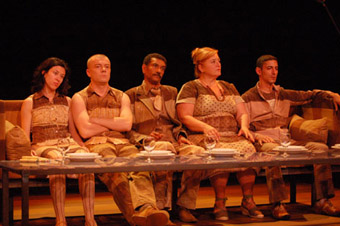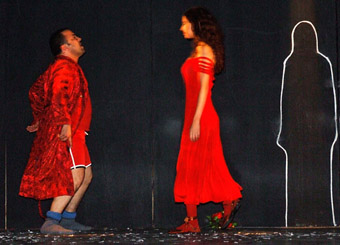performance for making change
clare grant at cairo's festival of experimental theatre

Fuck Darwin or How I Learned to Love Socialism, Montenegrin National Theatre
AS PERFORMANCE SPACE DIRECTOR FIONA WINNING POINTED OUT WHEN SHE WENT THERE IN 2006 AS A JUROR, THE CAIRO INTERNATIONAL FESTIVAL OF EXPERIMENTAL THEATRE IS STRUCTURED AS A COMPETITION. THERE ARE BEST ACTOR, ACTRESS, PERFORMANCE, ENSEMBLE, DIRECTOR AND SCENOGRAPHY CATEGORIES—A BIT LIKE THE OSCARS, AS WERE SOME OF THE DRESSES AND A SORT OF MINI-PAPARAZZI VERY ACTIVE AT THE FOOT OF THE STAGE AT BOTH THE OPENING AND CLOSING CEREMONIES.
CIFET attracts performances from about 70 countries, selected initially by various means in the countries of origin. Once in Egypt, some shows are then filtered through yet another selection process to be viewed and judged by the internationally composed jury.
I was invited to the festival in September 2007 as ‘Honouree’, and it was indeed a real honour to see so much work from Middle-Eastern countries, with a smattering of shows from Eastern Europe and from the USA and UK.
Farouk Husni, Minister of Culture and founder of the festival, has worked to create “a context of human openness and communication” and to “acknowledge change”, and by its very existence the event does so. However, aspects of the festival have been questioned in its 19th year, in the print and online press and the final speech from this year’s Jury Chair, Karen Fricker (UK). The openly contentious issues included the competitive nature of the event itself and, on several occasions, the lack of technical and other support for performers and performances, also drew attention. After his colleague’s mid-performance announcement that they were stopping their performance because of technological breakdowns, an actor from Bulgaria called on the festival to consider if it was worth holding it at all without what he saw as proper support, extending to those works selected for the Jury to view.

A Non-Identical Copy, Al Teatro
The place of technology in theatre was in fact the central issue at the symposium, two days of debate from writers and directors for and against the use of technology. It was surprising how many invocations there were to Jarry, Aristotle and the Futurists, sometimes on both sides of the argument. But it was a multimedia work from Syria (Show Cola) which won the Best Performance. I missed seeing it because of the complexities of negotiations with my driver, and the lack of theatre addresses in the program.
The emerging issue of gender politics was also a matter for much discussion within the Jury meetings, I gather, and certainly among audiences. Highly problematic and generalised in its stance, the generalisations of The Mask from Jordan polarised, even alienated, many in its audience with its emotive presentation of the oppression of women. But then there was a sassy, sexy and challenging group of young Egyptian women, all new to performance, who played to packed houses—mostly Arabic, of both sexes and many ages, laughing, sad and pensive in their response to very bold work.
It was an Egyptian-Montenegran work, Fuck Darwin!, Or How I Learned To Live With Socialism, from Cairo director Ahmed El Attar which seemed most closely related to forms of contemporary performance. It played with time and declared the presence of the performer as more than actor more overtly than any other work I saw at the festival. Also impressive was the stark Iraqi version of Macbeth that presented four characters in modern western civic and military dress in a series of monologues and dialogues inside a bare architectural set almost suggestive of the work of the Futurist painter, Carlo Carra. Macbeth’s dying speech was a city power broker’s lament that deepened into something much more about death.
A powerfully staged work from Tunisia, Al-Teatro’s A non-identical copy, comprising a doubled Mephistophelean figure and disjointed images of power, captivated me although I didn’t understand it at all. Shifting power plays in a state of war were also evident in an almost surreal work from Bahrain, Basic Colours, with images of strange shelters, hand to hand battles and an unforgettable man in white underwear trailing a string of tin cans as he walked, circling through the unending and shifting battles for power between the members of an all male cast.
Much of the work in the festival was performatively naïve, bound to the the centrality of narrative and authenticity, and assuming obscure references would be carried across by passionate intent. Some shows seemed simply too raw to be showing in such a robust setting—an exquisitely performed little mime/drama from Sri Lanka expressing the pain of the country's ongoing war, and a mysterious and messy but oddly haunting piece from Mauritius that incorporated expressive movement, Shakespeare, classic Greek drama, Hindu and stylised African figures and a bunch of op shop costumes and props.
Stark representations of the Egyptian legal system were presented in a small piece that moved between several tiny upstairs rooms in the faded grandeur of one of the Townhouse venues, very much outside the environs of the festival. In another Townhouse performance, the well-known actress Nora Amin presented a grieving monologue in recognition of the anniversary of a tragic 2005 theatre fire in which a number of prominent Cairo theatre practitioners died.
As its honorary president, Martha Coigney (USA) said in her presentation at the end of the event, the festival “is a celebration of experimental theatre in the world, a recognition of what is next.” It has certainly opened my eyes to just how much is involved to make theatre, and prompts the reiteration of Martha’s final call: “Instead of war, have a festival!”
Cairo International Festival of Experimental Theatre, Cairo, Sep 1-10,2007
RealTime issue #85 June-July 2008 pg. web






